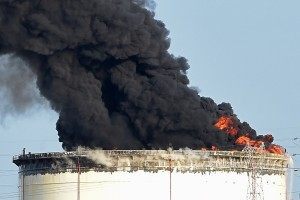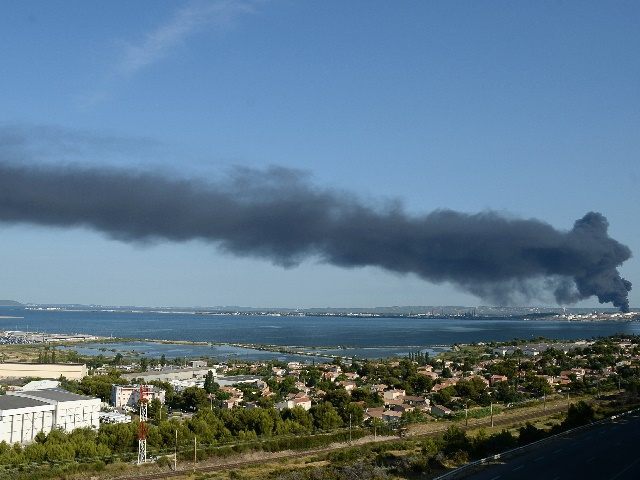Three deliberate, simultaneous explosions rocked a major petrochemical plant in France on Bastille Day, but as usual it is still ‘too early to talk about terrorism’.

Naptha burns on Tuesday after a suspected terror attack near Marseilles, France / AFP PHOTO / BORIS HORVAT
Despite the nature and severity of the attack, which French investigations have conceded was deliberate and with a delicious turn of French understatement “malicious”, yesterday’s explosions at the Berre L’Etang refinery in second city Marseilles failed to make the front page of a single English-language newspaper this morning. The explosions took place on Tuesday morning and set alight two enormous petrochemical tanks which stood half a kilometre apart, immediately ruling out the possibility of blaming an industrial accident.
A third device exploded on another tank but failed to set it alight, reports Le Parisien. One of the tanks contained highly-refined naphtha, and took 50 fire engines most of the day to put out, burning away “thousands of cubic meters of oil”, although thankfully there were no injuries.
French authorities now say they have recovered remains of an electronic detonator, proving criminal intent, and holes cut in the fence around the tanks suggest the explosions were not an inside job. It has also not gone unnoticed that the site of the attack is only 12 miles away from a major theft last week of explosives from a French army depot.
Breitbart London reported on the disappearance of 40 grenades, 200 detonators, and an unspecific quantity of plastic explosive which has left police stumped as the facility had no-one on patrol and no CCTV. The thieves were able to wander the site at leisure, prising open the doors of 12 buildings to search for loot before leaving, unchallenged.
Despite all of this, French authorities are publicly postulating every cause conceivable except for Islamist terrorism. France’s Libération reports the remarks of one police insider, who explains:
“Everything is possible… This can be a revenge related to an industrial dispute, or a dismissal. It could be a competitor wishing to destabilize [NY Stock Exchange listed plant owner] LyondellBasell. It could be a neighbour tired of the smell and pollution of the site. Or activists wanting to prove that Seveso sites are poorly protected. It’s very open and, for the moment, we have little evidence because everything is charred”

Herve Cornara was decapitated by Yassin Salhi last month in an industrial site terror attack in the south of France / AFP
Judging the French government by their actions rather than words over this attack, it seems likely they don’t truly believe an angry neighbour tired of living next to a refinery getting too keen with a box of matches is a more likely hypothesis than Jihadism. A government spokesman rushed on Tuesday to reassure the French people that efforts were being made to re-assess the security of the nation’s ‘Seveso’ sites – this was after all the second major attack on a French Seveso in three weeks.
In June, French Muslim Yassin Salhi targeted a chemical plant at Saint-Quentin-Fallavier, murdering his boss and impaling his decapitated head on the facility fence and draping it with black Islamic State flags. He then proceeded to drove his van into gas bottles in an attempt to destroy the factory in a suicide explosion, but failed.
As Salhi tried to crack open explosive acetone bottles in a last-ditch attempt to start a fire, he was wrestled to the ground by a fireman. As reported by Breitbart London, in an act of sheer audacity Salhi told police that he was only pretending to be a terrorist, and his actions were due to “personal difficulties” with his life.
A ‘source close to the investigation’ parroted the usual line, giving credence to Salhi’s defence, remarking: “Investigators are wondering whether this isn’t just a simple criminal act”.
The Seveso system is a means of classifying sensitive industrial sites across Europe according to their threat level and storage of hazardous material, of which there are over 1,200 in France. The system is named for the Seveso disaster of 1976, in which large quantities of Agent-Orange like compounds were released in Italy by an industrial accident, exposing 40,000 people to the chemical trichlorophenol.
Follow Oliver Lane on Twitter: Follow @Oliver_Lane or e-mail to: olane@breitbart.com

COMMENTS
Please let us know if you're having issues with commenting.